Search by category:
Community Events | Classes + Workshops | Conferences | Jobs + Internships | Grants

- This event has passed.

Zenger Farm Apprenticeship
November 20, 2018 @ 8:00 am - 5:00 pm
Deadline is January 27, 2019.
**Shorter Summer or Fall Farm Internships also available**
Farm apprentices graduate ready to work on a sustainable mixed-vegetable farm as a Crew Leader, Harvest Manager, Field Manager, or Crew Member. We are proud that so many of our past full-season farm apprentices currently have successful farming careers. Between 2010 and 2017, 26 full-season farm apprentices graduated from our program and 21 of them (80%) farmed during the 2018 growing season, 15 of them (55%) as farm owners or farm managers.
We seek to train an inclusive next generation of farmers. Nationwide, the average age of a farmer is 60-years-old, 85% of farmers are men, 95% of farmers are white. Many other groups are underrepresented. This farm apprenticeship program is designed for people with little or no experience farming. We encourage people of color, women, LGBTQ people, religious minorities, recent immigrants and applicants from different generational, economic and educational backgrounds to apply. Farm apprentices rarely work independently and instead spend most of their time being closely mentored by our two farm co-managers, Bryan and David. Both are cis-men of European descent with no African, Latino, or Indigenous heritage; one is gay and the other bisexual. It is important to consider how their identity may shape your experience.
We seek to provide an economically-viable alternative to “conventional agriculture.” We adopt a view of food sovereignty. Farms should be responsible members of their communities. Farms should improve community resilience and self-reliance. Farms should foster healing connections with the land. We seek to reform conventional farming practices that depend heavily on machinery, chemicals and exploited labor. Conventional agriculture damages land, air and water; harms the health of communities that consume the food grown; and harms the workers who feed our communities.
Farm Apprentices care for four acres of diversified vegetable crops, fruit orchards and laying chickens. We strive to model social justice and economic viability at our organic farm. We earned $140,000 from the distribution of produce in 2018. Over 90% of income was from vegetable crops. 70% of our produce feeds our 200-member CSA, with pick-ups at the farm and at the nearby Multnomah County Mid County Health Center. Our farm is in a culturally vibrant neighborhood and we operate a bilingual English/Spanish CSA. Our farming operation allows us to model innovative practices. In one such program, we educated over 500 other CSA farmers how to accept SNAP payment. We have since set up a system to provide centralized SNAP processing for over 50 Oregon CSA farms. In another such program, for-profit CSA farms are paired with low-income health clinics providing subsidized shares to patients with diet-related illnesses, called CSA Partnerships for Health. The remainder of our produce sales are to local restaurants.
The core of the Zenger Farm Crew consists of two experienced farm co-managers and four full-season farm apprentices. Four short-season interns will join the crew 2 days/week for 8 weeks at a time in the Summer and again in the Fall. Farm apprentices rarely work independently and instead spend most of their time being closely mentored by our two farm co-managers. Similarly, farm apprentices will work closely with and mentor the farm interns. Additionally, farm apprentices will lead volunteers and other work parties.
Education of the body is a core component of this apprenticeship. We teach apprentices the underlying ergonomics of farm work. Proper ergonomics are essential for an economically-viable farm. Your speed, stamina and efficiency will allow you to operate your own farm and compete when other farms lower their costs with machinery, chemicals, and exploited labor. Close mentorship from our farm managers allows apprentices to learn proper ergonomics.
We provide an immersive and comprehensive education in farming. Farm apprentices will have direct experience in all aspects of our farming operation, taking turns being responsible for every aspect. The farm apprenticeship includes over 40 hours of classroom instruction in topics such as crop planning, irrigation, seed saving, soil fertility, enterprise budgeting, etc. Farm apprentices will be provided additional opportunities to attend classes and tours at other local farms. While apprentices will occasionally participate in other programming at Zenger Farm (youth education and community engagement), most of their time is spent farming.
We provide a compassionate and healing education. Zenger Farm recognizes that many people have experienced trauma on the land, including the land where Zenger Farm is located, which is stolen indigenous land. The farm crew reminds ourselves that indigenous people are still connected to this land by incorporating culturally specific practices and centering indigenous knowledge and history. As a crew, we foster a healing environment with positivity, mindfulness, shared responsibility, Nonviolent Communication, regular check-ins, open feedback (both given and received), and Popular Education methods. Together, we examine the root causes of injustice in our food system with facilitated discussions prompted by readings, talks, videos and personal stories shared by the apprentices, as well as visits with other community members and leaders.
Time Commitment
- March 18th – October 31st, Monday – Thursday, 8-10 hours/day
- An additional 4-8 hours every fourth Friday during May 17th – September 13th.
- One 50-hour week, Monday-Friday, to be scheduled as a crew in June or July.
- Approximately 16 additional hours over the entire season to attend other programming at Zenger Farm including community dinners, events, fundraisers, field trips, etc.
Responsibilities
- Field work: Most field work at Zenger Farm is done with hand tools, and includes seeding, amending, transplanting, weeding, irrigating, trellising, pruning, season extension, pest management, harvesting, hauling and washing produce for sale.
- Machinery: Operate and maintain a weed whacker, mower, chainsaw, and 2-wheel tractor (BCS) with various implements.
- Rotating responsibilities in all aspects of our farming operation, such as management of the propagation greenhouse, irrigation, animal care, and field preparation; leading planting, harvest, wash and pack, and volunteer work parties; staffing CSA pickup and writing newsletters; and, toward the end of the apprenticeship, a two-week rotation managing the entire crew in all farming operations.
Qualifications
- Demonstrated interest in gardening or farming.
- Ability to lift and carry 50 pounds, farm outdoors in all weather conditions and perform the above responsibilities.
- Attitude: Positive, driven, flexible and team-oriented.
- We will perform a background check and address any issues on a case-by-case basis – no one should feel discouraged from applying.
- We can not help with visas or work permits for this program.
Benefits
- Stipend: To be determined in our annual budgeting process and posted no later than December 1st (in 2018, the stipend was $1,125/month). This stipend is intended as an approximation of the expenses the volunteer apprentice incurs during the program. The stipend is not tied to productivity and does not vary with the amount of time spent volunteering.
- 1 full CSA share (May-October)
- Caretaker housing is available for one apprentice (optional). Cost is to-be-determined in our annual budgeting process and requires, in addition to the apprenticeship, 20 hours/month in caretaker duties. Caretaker housing includes a private bedroom and private bathroom in the upstairs of the farmhouse where the kitchen/living space is shared with other programming at the farm (summer camps, workshops, community meetings, etc.). Details will be discussed during the interview, but feel free to contact Bryan beforehand if necessary.
Selection Timeline
Apply by end of day Sunday, January 27th, 2019. We will review applications, conduct interviews and make offers by February 15, 2019.
Application Instructions
You can apply online or by US mail. Please do not submit your application by email.
- Apply online at zengerfarm.org/portland-farm-apprenticeship or
- Print and mail the following application to: Zenger Farm, Attn: Bryan Allan, Farming Apprenticeship, 11741 SE Foster Rd. Portland, OR 97266.
Contact Bryan Allan (bryan@zengerfarm.org) with any questions, but please do not submit your application by email.
Bryan Allan
Farmer
Zenger Farm
503-516-9360
Search by category:
Community Events | Classes + Workshops | Conferences | Jobs + Internships | Grants
